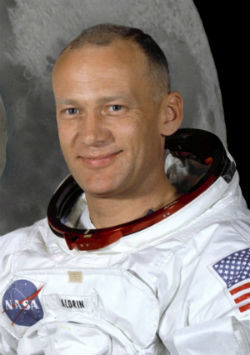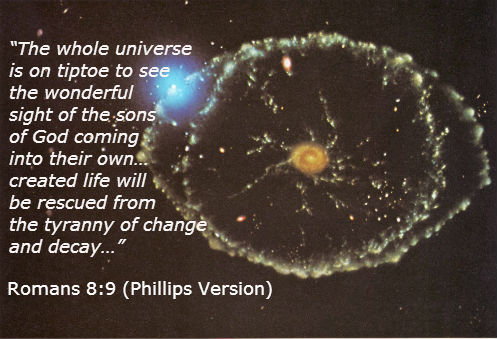 Buzz Aldrin
Buzz AldrinBy Neil Earle
 Buzz Aldrin
Buzz AldrinThe past week some news outlets paused to remind us of humanity’s most impressive technological feat – the sending and safe return of three human beings to the moon and their safe return. Those who were alive that summer of 1969 will always remember Armstrong, Aldrin and Collins.
Our world news that summer of 1969 was literally out of this world.
Though we have always been space travelers – our planet logs 428,000 miles every day – the landing of Apollo 11 on the moon’s surface was truly a transformative event.
The pictures of our sparkling planet suspended above a bleak lunar surface underscored the fragility of our home in the cosmos.
The first Earth Day – April 22, 1970 – showed that one message got through. The Canadian thinker Marshall McLuhan summarized it as “on Spaceship Earth there are no passengers; everybody is a member of the crew. We have moved into an age in which everybody’s activities affect everybody else.”
Apollo 11 gave the environmental movement of the 1970s a fresh spin. Books such as The Limits to Growth, Small is Beautiful, If You Love This Planet helped birth the phrase “quality of life.” The anti-nuclear movement, the New Age movement, micro-circuitry, science fiction-all were given a boost by the sight of human beings investigating the lunar dust.
And what of the key participants? What was on the minds of the crew of Apollo 11 that unforgettable July 20, 1969?
 "When I consider your heavens..."
"When I consider your heavens..."One of them, Commander Edwin “Buzz” Aldrin kept his plans to himself. Earlier, in December 1968, the crew of Apollo 8 had drawn fire from atheist groups for reading from Genesis 1 while they orbited the moon that Christmas Eve. This seemed to some Americans to compromise the strict separation of religion and state. NASA was a government agency. How dare the astronauts bring God into the picture? One judge threw out a court case launched against Apollo 8 by claiming that the event “was out of his jurisdiction.”
Apollo 8’s precedent made Aldrin’s actions even more significant.
An Episcopalian, Aldrin had somehow wedged into his stowage pouch a plastic bag. In it were a small flask of wine, a chalice and some wafers. About 5:57 P.M. earth time, he set the elements on the fold-down table for the guidance computer. He keyed his mike: “This is the LM [Lunar Module] pilot speaking. I’d like to take this opportunity to ask every person listening in…to pause for a moment and contemplate the events of the past few hours, and to give thanks in his or her own way.”
Aldrin’s way was to pour the wine into the chalice which curled gracefully against the side of the cup. He recited silently John 15:5, “I am the vine you are the branches…without me you can do nothing.”
Doing Communion on the moon!
This remarkable story is relayed in Andrew Chaikin’s history, A Man On The Moon: The Voyage of the Apollo Astronauts. Back on earth, Aldrin’s wife Joan marveled – Buzz had not forgotten the deeper significance of what was happening on July 20, 1969. On his return to earth, Aldrin reflected aloud upon the meaning of Psalm 8:3-4, words written some 2800 years before by another gazer into the starry night: “When I consider your heavens, the work of your fingers, the moon and the stars, what you have set in place, what is man a that you are mindful of him, the son of man that you care for him?”
How ironic!
Humanity’s most stunning technological feat took some of the key players back – if only for a few moments – to the Creator. The view from space filled the highly trained macho men and technicians aboard Apollo 8 and Apollo 11 with thoughts of our own place in the cosmos.
Their questions remain: What, indeed, is man?
Why are we here?
What is the purpose of our journey?
What is the mission for Spaceship Earth?
Those questions help frame the message the world forgot that marvelous summer of 1969. As the apostle Paul told a group of advanced thinkers back in Athens, Greece in the first century, the Great God is not far from every one of us, even on the moon (Acts 17:27).
Aldrin’s actions – like Borman’s before him – show that there is a God-shaped consciousness inside each of us, the passengers on our fragile spaceship. That inner awareness is a gift of God to all of us, “the light that lightens every man and woman” (John 1:9). Or as the Psalmist wrote centuries ago: “Where can I go from your Spirit? Where can I fell from your presence? If I go to the heavens you are there…If I say ‘Surely the darkness will not be dark to you, the night will shine like the day, for darkness is as light to you.”
It’s dark on the moon. But not entirely. God gives us humans the gift of potentially being in Communion with him wherever we are, as the Psalmist wrote and as Aldrin’s actions showed. This gift reminds us how close he is to us in all our cares and worries here below, and we seem to have plenty of them right now.
This encouraging reminder can spring to the surface at the most unexpected times, just as it did that summer of 1969. A good time to remember.